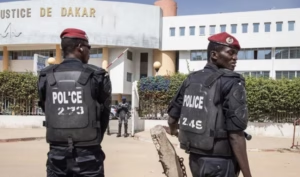A chartered flight carrying 49 South African Afrikaners departed from OR Tambo International Airport on Sunday evening, bound for the United States, following approval by the International Air Services Council. The journey marks the first leg of a politically sensitive resettlement process facilitated by the administration of United States President Donald Trump, who has controversially extended refugee status to selected South Africans claiming discrimination.
Speaking to broadcaster Newzroom Afrika from OR Tambo International Airport in Kempton Park, Collen Msibi, spokesperson for South Africa’s Department of Transport, confirmed that the required authorisations were secured before the flight was allowed to land and depart.
“First of all, the reason I am here is that there was an application lodged with the council, which is the International Air Services Council. That was lodged on May 5, so we have had to take that application to the council,”
said Msibi.
The application, according to Msibi, included specific details required for consideration, including the number of passengers, flight routes, and the purpose of the operation. The permit granted, known as a foreign operator’s permit, was issued following a rigorous assessment process.
“With that set of application, you have got to state a number of things, first is how many flights are involved, how many passengers are we talking about and the route that you will be taking. All that information was contained, but most of all it was the reason. It was stated quite clearly that this is for the Afrikaners who are relocating to the US as refugees,”
he stated.
According to Msibi, the Civil Aviation Authority also played a key role by inspecting the technical elements of the flight, including aircraft safety compliance and the credentials of its crew.
“That was taken to the council, hence the application was approved. We are talking of about 49 people from what I saw in terms of those who are going to be on this particular flight,”
Msibi added.
The flight, which originated in Texas, made stopovers in Dakar, Senegal, before arriving in Johannesburg. Its return path is scheduled to follow the same trajectory—Johannesburg to Dakar, then on to Washington DC, before heading back to Texas.
“That was done and they are quite aware of what is happening. This flight comes from Texas and it went through Dakar (Senegal), and to OR Tambo International Airport. As it takes off, it is gonna go the same route – OR Tambo, Dakar, Washington DC then back to Texas. Basically that is the route that they are taking,”
said Msibi.
The aircraft operator was also obligated to coordinate with South Africa’s Air Traffic and Navigation Services (ATNS), informing authorities of its planned path and real-time positioning.
“As they pass all these stations, they need to report to the ATNS in terms of their whereabouts. It is part of the mandate of the ATNS,”
Msibi explained.
While the logistical processes for the flight appear to have been meticulously managed, the political context surrounding the relocation has drawn significant criticism. On Saturday, the Department of International Relations and Cooperation (DIRCO) expressed strong disapproval of the characterisation of South African citizens as refugees, suggesting it undermines the nation’s democratic institutions.
The department said the move is not only inaccurate but politically charged.
“The resettlement of South Africans in the United States under the guise of being ‘refugees’ is entirely politically motivated and designed to question South Africa’s constitutional democracy,”
an official statement from DIRCO read.
The United States government, however, has moved forward with the process. Reports indicate that officials from the US Department of State and the Department of Homeland Security will begin welcoming the Afrikaner arrivals in Washington DC starting Monday. These individuals are being granted refugee status under new criteria introduced by the Trump administration.
Notably, President Trump’s administration halted the broader US refugee resettlement programme in January, his first day in office. The abrupt suspension left over 100,000 approved applicants from conflict zones such as the Democratic Republic of Congo and Afghanistan in limbo.
Yet, just weeks later, Trump signed an executive order that singled out Afrikaners—descendants of Dutch and French settlers in South Africa—for preferential treatment in the refugee process.
“…Afrikaners, descendants of Dutch and French colonisers who he claimed were discriminated against,”
reads a section of the report detailing the executive order.

















